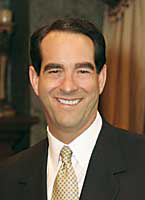Douglas Andrew has established a successful series of Missed Fortune workshops and books. The Missed Fortune principles are founded upon maximum funded tax-advantaged life insurance, but Douglas Andrew stresses these must be structured correctly. Much of this structure comes from obeying tax laws, Douglas Andrew says—primarily three major tax laws enacted in the 1980s regarding the insurance industry.
Douglas Andrew regularly fields questions about these laws. Today, he addresses questions about TAMRA—the Technical and Miscellaneous Revenue Act of 1988.
Q: Why was the TAMRA Law passed?
Douglas Andrew: In the 1980s, people were putting large sums of money into life insurance policies because they knew life insurance companies were stable. Feeling the competition, banks and institutions lobbied Congress and the result was the TAMRA Law of 1988.
Q: What is the TAMRA Law?
Douglas Andrew: In essence, with the TAMRA Law, an individual cannot put his or her money in an insurance policy all at once and maintain a tax-free environment.
Q: So someone has to slowly put money in?
Douglas Andrew: It must be deposited gradually over several years in order to comply with TAMRA.
Q: Do we have to comply with TAMRA?
Douglas Andrew: Yes, if we want our money to be tax-free when it’s taken out, it’s important to comply with all of the stipulations of TAMRA.
Q: What if someone has a policy that dates prior to TAMRA?
Douglas Andrew: If someone has a policy that was taken out prior to TEFRA, DEFRA, and TAMRA, then they don’t apply. These policies were grandfathered in because they were established prior to these laws.
Q: Why should I choose a maximum insurance tax-advantaged life insurance policy over stocks and bonds?
Douglas Andrew: Insurance companies have been around since the 1800s, weathering all the ups and downs in the market. In the economic turmoil of recent years, not a single life insurance company has gone out of business.
Q: How many banks have gone out of business?
Douglas Andrew: At last estimate, more than three hundred with the recent recession.
Q: What about fees?
Douglas Andrew: The goal is to incur the least amount of fees possible, but as I tell our Missed Fortune clients, I’d rather be paying fees to an insurance company than fork over large sums of my earnings to pay taxes.
Q: How much can a person expect to pay in fees for maximum funded life insurance?
Douglas Andrew: Using the methods outlined in Missed Fortune, someone netting eight percent would pay about one percent in fees over the life of the policy. That’s seven percent with no taxes required.
For more information on Missed Fortune and Douglas Andrew’s advice on choosing maximum funded tax-advantaged life insurance contracts, visit http://www.missedfortune.com. Douglas Andrew has had two national bestsellers and his Missed Fortune seminars are in demand throughout the country.

